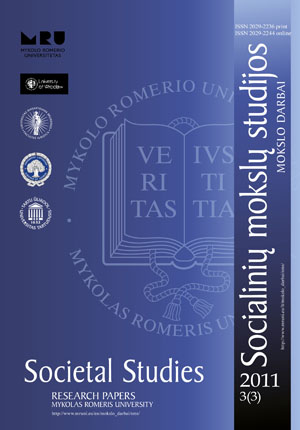Laikmenų ir įrangos mokesčių (atlyginimo autoriams ir gretutinių teisių turėtojams už kūrinių atgaminimą asmeniniais tikslais) perspektyva po ESTT Pad
Perspective for Copyright Levies (Compensation for Authors and Neighbouring Rights Holders for Private Copying) after EUCJ Padawan Decision
Author(s): Mindaugas KiškisSubject(s): Social Sciences
Published by: Mykolas Romeris University
Keywords: copyright; copyright exceptions; private copying; fair compensation; copyright levies
Summary/Abstract: The article investigates the discourse on the media and equipment levies (compensation to authors and related rights holders for the personal copying—copyright levies) in Lithuania, the European Union and some other countries. The article thoroughly considers the nature of copyright levies, premises for establishing the levy system, as well as purposes of such system (functional rationale). Provisions of the EU Directive 2001/29/EC on the harmonization of certain aspects of copyright and related rights in the information society, as well as the Lithuanian legislation pertaining to copyright levies are thoroughly analyzed. Scholarly work on the topic in Lithuania is reviewed and assessed. It is discovered that scholarly positions are separated along the ideological divisions of intellectual property law, and are generally representative of the general doctrinal approach to intellectual property. Conservative classical approach understands levies as the compensation for statutory license, while liberal and epistemic approach considers levies detrimental to the creative society, socially unjust and serving one specific interest group at the expense of society at large. It is also concluded from the analysis, that theoretical approach to levies in Lithuania is not original and rather representative of the academic debate on the matter in Europe. Specific peculiarity in Lithuania is the notable Supreme Court case law (Trajektorija case), which extensively deals with the nature and scope of copyright levies. The European Commission identifies copyright levies as one of the key reform areas in copyright law. It is also closely related to collective administration of copyright, another reform area. In Lithuania, as well as many other European countries, there are pending legislative proposals on significant extension of the copyright levy system. Newest decision of the European Union Court of Justice in the Padawan case has introduced urgency to the matter, as well as significant new considerations on the possible scope of the levies. Main conclusion of the Padawan case is that the indiscriminate application of the levy, in particular with respect to digital reproduction equipment, devices and media not made available to private users and clearly reserved for uses other than private copying, is incompatible with the Directive. This effectively means that copyright levies shall be collected only on media and equipment, which is sold to consumers. In Lithuania the matter was subject to notable case law in the 2008 Supreme Court case of LATGAA v. Trajektorija, which provided rather controversial interpretation of the EU Directive, which is now in direct conflict with the Padawan interpretation. Moreover, two additional cases directly related to copyright levies are pending in the European Union Court of Justice. The article provides an analysis of the Padawan case conclusions, as well as review of considerations for future r
Journal: Socialinių mokslų studijos
- Issue Year: 3/2011
- Issue No: 3
- Page Range: 871-896
- Page Count: 26
- Language: Lithuanian

